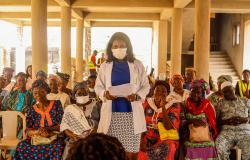
Dominant theories stipulate that high levels of authority are a prerequisite for effective problem-solving by international organizations (IOs). How, then, can we explain that African health organizations possess relatively low levels of authority, yet their response to COVID-19 has been touted as a remarkable success? In this article, we explain how low-authority IOs can engage in effective problem-solving. By rethinking the conventional zero-sum relation between national sovereignty and an IO's problem-solving potential, we develop a novel framework that allows us to analyze diverse cooperation logics pursued by various organizational actors within an IO. Applying this framework to the response of ECOWAS and its sub-agency, the West African Health Organization (WAHO), to the COVID-19 pandemic reveals that problem-solving cooperation dominated over symbolic and autonomy-oriented cooperation logics. This prevalence of problem-solving did not derive from ECOWAS' authority over states, but emerged because its member states saw it as expedient to address these issues through the organization. Our analysis shows that low-authority IOs can problem-solve if member states consider them to be transmitters instead of constraints of national sovereignty, that is, as suppliers of organizational services that enhance state capacities.
Policy implications
- Policy-makers need to look beyond the taken-for-granted assumption that only high-authority IOs can promote effective problem-solving. Pushing for more ‘supranationalism’ may even be counterproductive as it can cement zero-sum narratives about IOs encroaching on member states’ sovereignty.
- In their communication with national representatives, IO officials should strive to create government buy-in by highlighting how their organization can enhance the sovereignty of member states through functions such as knowledge-building and information sharing, strategic and logistical coordination among member states, and liaising with external partners.
- Specialized and technical agencies of IOs, such as WAHO, are too often ignored. Member state decision-makers, donors and other policy-makers need to recognize their importance for effective problem-solving in policy fields such as health.
- Rather than focusing on grand schemes for regional integration, donors and external support can bolster the problem-solving potential of IOs in the Global South by providing tailor-made support for the capacities of specialized and technical agencies.
Photo by Lagos Food Bank Initiative